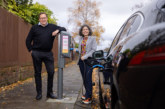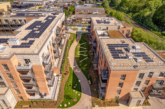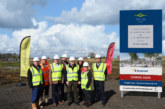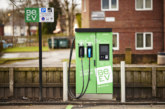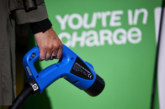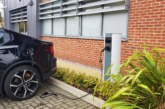Charge Point Operator Mer and installers Joju Charging are supporting Bournemouth, Christchurch and Poole (BCP) Council’s sustainability goals with the roll out of EV charging infrastructure.
Sustainable transport forms a key part of the Council’s Climate and Ecological Emergency it declared in 2019. Amongst the pledges was the re-examination of the taxi licensing criteria so that it prompts an uptake of electric/hydrogen vehicles, the exploration of the introduction of electric/hydrogen buses, and the consideration of the installation of electric vehicle charge points across the conurbation. To meet its sustainability goals in the transport field, an increase in EV charging infrastructure is needed.
Mer has initially installed 12 rapid chargers across the area as part of an upgrade and replacement programme on historic infrastructure, the majority of which was achieved in 2021. The expansion of BCP’s infrastructure is now continuing with Phase 2 of the project, as Mer continues to partner with installation specialists, Joju Charging.
Carried out through Hampshire County Council’s Central Southern Region Framework (CSR), the expansion of BCPs infrastructure has been almost four years in the making. Phase 2 involves the installation of fast and rapid public chargers at car parks across the Bournemouth, Christchurch and Poole region.
Over 130 new chargers are to be installed across 34 Council-owned carparks. Four sites have been designated for rapid hub installations of eight 50kW-150kW rapid chargers including Hawkwood Road and the Pavilion car parks in Bournemouth, Bank Close in Christchurch, and Seldown in Poole. Mer’s rapid hub chargers will dynamically balance the power available across charging vehicles. This means that if fewer than eight cars are charging, then each vehicle can charge at a higher power, making charging more efficient for residents and visitors.
The 50kW rapid chargers enable drivers to charge their EVs to 80% in approximately 40 minutes, whilst the 22kW fast chargers offer a steady charge over a longer timeframe, making them suited to locations where drivers are staying for an extended period of time.
Karl Anders, Managing Director at Mer UK, said: “Working with a major Unitary Authority like BCP Council, that is prioritising the planet by tackling climate change and driving EV adoption for residents, is an encouraging step forward to meeting the government’s 2030 targets.”
With Joju Charging, Mer is deploying more and more chargers across the South Coast of England, and this project is in addition to those in the neighbouring councils of Dorset (50 chargers), New Forest (20 chargers), and Isle of Wight (28 chargers).
Joe Michaels, Founder and Commercial Director at Joju Charging commented: “It’s fantastic to be continuing our work with BCP Council as we design, deliver, and install EV Charging infrastructure to help meet the Council’s sustainability goals, alongside Charge Point Operator and funding partner, Mer..
Supported by the legacy of Statkraft, the leading generator of renewable energy in Europe, Mer provides chargers that are powered by 100% renewable, zero-carbon energy. As a result, the roll out of the infrastructure supports the Council’s wider goals surrounding energy, including their aim to procure all Council electricity from renewable, zero carbon sources.
Councillor Mike Greene, BCP Council’s portfolio holder for transport and sustainability said: “The proposed infrastructure ensures the transition to electric transportation amongst our local residents is more accessible. Now with additional infrastructure to the existing chargers at supermarkets and hotels, residents and visitors can feel confident that EV driving is an achievable and attractive prospect.”
As usage increases, Phase 2 will involve the expansion of the infrastructure in the current carparks, in addition to the development of on-street charging.



